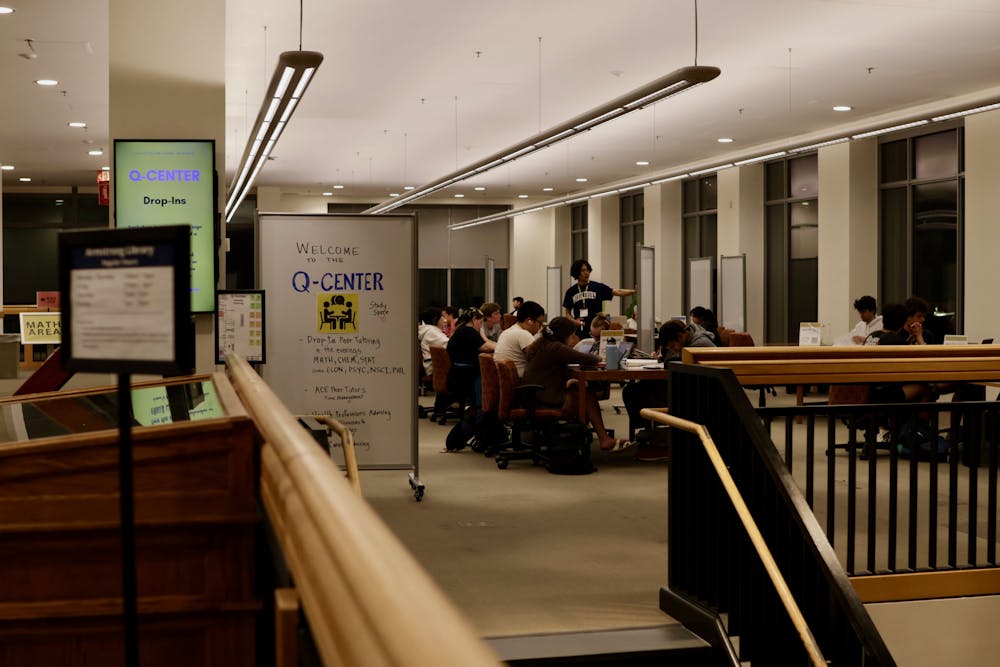For students who frequent BiHall, it is hardly a secret that changes are happening to the Armstrong Science Library space this fall. The library’s main floor — now an extension of the Center for Teaching, Learning and Research (CTRL) called the Armstrong Quantitative Center or “Q-Center” — has transformed from the quiet, bookish atmosphere it harbored just last spring. The same space is now packed with students gathering to discuss their work around subject-specific tables and whiteboards, ready to jump into their next chemistry equation or physics problem.
The current Armstrong Library — which provides curriculum and research support in the fields of biology, chemistry and biochemistry, computer science, environmental studies, geography, geology, physics, and psychology — will close by this coming January, according to Amy Morsman, professor of History and interim director of the CTLR. The shelves on the ground floor of the library will be removed and replaced with a quiet space for study carrels, and the main floor will remain the Q-Center. Armstrong’s current materials will be distributed in Davis Family Library’s collection or placed in external storage.
The decision to remove Armstrong was due to a low level of circulating materials and the high quantity of resources that students access exclusively from online databases, according to Morsman.
“I think a lot of people now, faculty now, they have journal articles and stuff that they want their students to read, they’re in databases that tuition dollars pay for, they’re in textbooks that they’re getting, so it’s not like the stuff that’s coming out of Armstrong will be thrown away,” Morsman said.
The Q-Center is an extension of the CTRL and is a space chiefly designed to strengthen academic support for all levels of quantitative areas, according to Morsman. The hope is to create a designated space for tutors and teaching assistants focused on STEM and quantitative topics to meet with students seeking help outside of class, as well as for faculty who choose to host office hours.
Though Armstrong will be changing its function this year, some aspects will remain the same. Sean O’Neil, the supervisor at Armstrong for 14 years, made it clear that the space on the lower floor will continue to serve as a quiet study space below the collaborative Q-Center.
“Armstrong has always been known as a study space for the campus, and it’s one of the quietest spots in BiHall,” O’Neil said, and that he plans to keep it that way. “We’ve relocated all the study carrels downstairs, while the upper floor now features an open format. We will still have public printing and poster printing here.”
Ideas for the Q-Center came about when faculty and staff considered how the space occupied by Armstrong could better be put to use. Given the challenges faced by students who experienced restricted learning opportunities in high school during Covid-19, many of them have expressed concern about their lack of solid backgrounds in math and other STEM-related subjects. This space is designed to try and fill those learning gaps, according to Morsman. She added that the new space is donor-funded, adding that the college has several donors interested in supporting Middlebury students who may feel vulnerable in quantitative areas.
“We want to normalize help seeking. We want to have workshops that are above and beyond just like ‘oh you’re struggling in Chem 103,’” Morsman explained. “Let’s have a workshop on how to build graphs in Excel! How many people could benefit from that? A ton!”
The faculty who use the Q-Center hope to foster a supportive academic environment where asking for help in quantitative disciplines is normalized, according to Interim Director of the Q-Center and Professor of Mathematics and Statistics Emily Malcolm-White. White is currently working to reimagine Armstrong as a center for academic collaboration and community-building.
Though the space is conveniently placed for STEM students, the Q-Center is intended for a range of people at the college. With hours open for tutoring in scientific, statistical, and psychological courses, the Q-Center is rapidly expanding to also include general career advising. Peer Career Advisors with the Center for Careers and Internships (CCI) will host drop-in hours in the space to assist with resumes, cover letters and interview preparation for STEM students.
“It’s exciting to see a lot of these things come together in one space where students can access multiple resources at one time,” Malcolm-White wrote in an email to The Campus.
With the space opening just next to the new first year dorm, Malcolm-White said she hopes the Q-Center will act as a magnet for new students who are trying to find their footing.
“Things that are beyond course-specific needs, that’s what we’re trying to do. We’re trying to get a buzz. We’re trying to say, ‘Come into this place,’” Morsman said.
The transformation into the Q-Center has been a work in progress. Students, staff and faculty alike have directed the Q-Center’s growth. Malcolm-White acknowledges the efforts of Vice President of Academic Affairs Jeremey Ward for getting the center off the ground.
“We’re building the plane as we launch it — as we take off,” Morsman said.
Guided by the question of how to help Middlebury students better self-assess, learn and integrate quantitative skills into their lives, the Q-Center is already off the ground and rising higher.
Editor’s Note: Managing Editor Madeleine Kaptein ’25.5 contributed reporting to this article.




